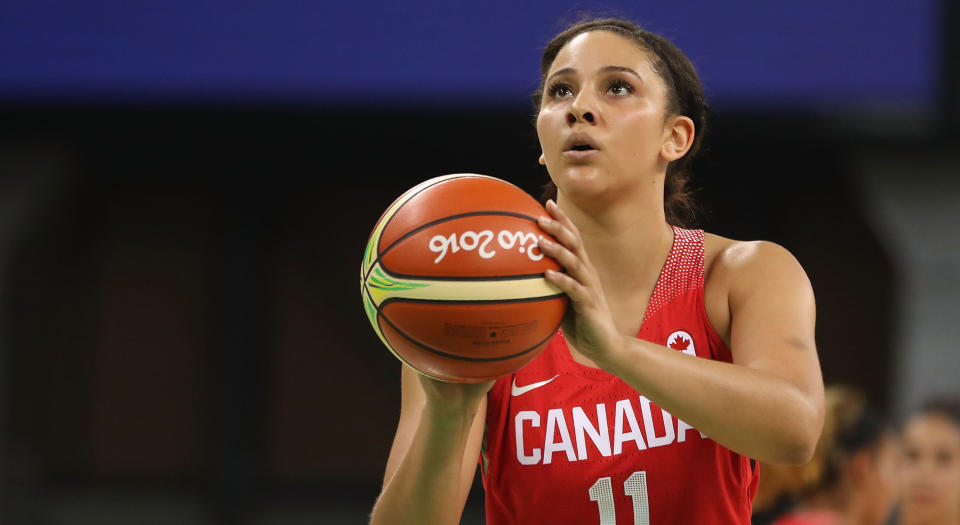A WNBA team should be next for Toronto's basketball scene

The USports women’s quarterfinal games on March 10 were sold out.
The championship game between Saskatchewan and Carleton was standing room only.
Back in December, when Kia Nurse (arguably the biggest name in Canadian women’s basketball) played a regular season game with her UConn Huskies at Ryerson University, seats weren’t available for that, either.
This is the norm for women’s basketball north of the border.
Incredible energy in this gym! Wonderful crowd enjoying a fantastic national semi final! Well done Regina, well done ! pic.twitter.com/PWaWjC0vU9
— Christine Stapleton (@Coachstapleton) March 11, 2018
So then why does representation disappear in Canada beyond the collegiate level?
cSome more photos from tonight's @UConnWBB win over @DuqWBB pic.twitter.com/B2oPHEGov5
— Alex D'Addese (@alex_daddese) December 23, 2017
A country that consistently earns a berth to the Olympic Games for women’s basketball, and is growing quickly into one of the most formidable athletic nations, is lagging behind in professional women’s leagues compared to other countries around the world.
Most countries in Europe host their own pro women’s leagues, and South American leagues are growing like wildfire, but Canada’s only women’s pro sporting league is the CWHL (Canadian Women’s Hockey League).
“Growing up in Canada, I didn’t have a women’s professional league to watch on TV, idolize players, or dream of playing in one day,” said Natalie Achonwa, a WNBA player for the Indiana Fever. “Instead, I was tagging along with my older brother to watch and cheer on the Raptors.”
And since Achonwa’s childhood growing up in Southern Ontario, even more professional men’s leagues have formed throughout the country (the National Basketball League of Canada and the Canadian Elite Basketball League). This is great for young boys, but where do young girls look to see women’s basketball in Canada?
“Luckily for me, I was able to start playing with Canada Basketball and the national team programs at a young age. This is where I found my role models. This is where I was able to discover and develop a dream of playing professional basketball,” said Achonwa.
“Representation matters. It is important for your young girls to be able to have the opportunity to see strong, powerful, successful women doing what they love. Whether it simply motivates a child to pick up a basketball and be active, or it sparks a dream of one day being a professional athlete, it is vital for our children to be able to see and imagine themselves in these roles.”
And Olympian Alisha Tatham, who grew up in Brampton, agrees.
“Not all young girls got [the] opportunity [to play for Team Canada], and didn’t have anyone to look up to close by,” she said. “I focused on bringing my talents to Europe and focused solely on representing my country. But, had I also got to experience seeing women playing at a high level professionally in North America I may have aspired to expand my goals.”
Tatham represented her country at the Olympic Games in 2012, and her sister Tamara played in 2012 and at Rio 2016, but she says had she been exposed to more basketball as a kid, she may have had different aspirations.
Sports have been a HUGE part of my life. I've been watching the Olympics since I was a little girl and I am so proud to be a Olympian today. I can't wait to cheer on @TeamCanada as they represent our country and showcase the values that unite us all! #WeAllPlayForCanada pic.twitter.com/1oZ4BWizcm
— Alisha Tatham (@A_Tatham) February 5, 2018
“If women like Lisa Leslie, Cynthia Cooper, Tina Thompson came out to camps or spoke to the young girls when I was a kid I know I would have wanted to be just like them,” said Tatham. “Just being able to go to a game down the street would have expanded my vision on what could have been possible for me as a young girl pursuing a career in basketball.”
Should Toronto rally for a WNBA team? #WeTheNorth
— Kelcey WrightJohnson (@kelwright) March 10, 2018
So what are we, as a nation that strives for and celebrates gender equality, waiting for?
WNBA players are already vastly underpaid compared to their male counterpart: LeBron James makes over $30 million per year, while Nneka Ogwumike, the reigning WNBA MVP earned a mere $95,000 in 2016 — the maximum salary in the league.
The argument against women’s pro hoops in Canada is largely based on an assumed lack of profitability, but with an entire nation of young women searching for somebody to look up to, the fanbase and money will come. It may take time to overcome certain obstacles, but it’s a shame that the NBA pushed for Canadian franchises and the WNBA isn’t supported in the same way.
The women’s league has hinted at expansion, but no concrete plans have been released.
“The WNBA is definitely something special,” said Achonwa, who will enter her fourth year in the league this summer. “I would love to have a team in Toronto one day.”
And Toronto’s fans would love it too.
Someone save this tweet if it becomes true. I hope in 2019, Toronto gets a WNBA team. It's way past time. If MLSE doesn't want it, I hope some other ownership group does.
— Aneela (@WHoopsBlogger) February 7, 2018
They sure did. It's was cool to be there sold out gm to watch young ladies ball. Now I'm wishing Toronto gets a wnba team
— Durag DeRozan (@Tdot_Girl21) December 26, 2017
I was hoping the WNBA/Canada news was that Toronto was getting a team.
— Jeff Dix (@dixjeff) February 2, 2018
More basketball coverage on Yahoo Canada Sports:


